|
|
|
Sort Order |
|
|
|
Items / Page
|
|
|
|
|
|
|
| Srl | Item |
| 1 |
ID:
165140
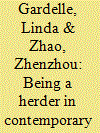

|
|
|
|
|
| Summary/Abstract |
Construction of a nomadic identity in contemporary society has received increasing attention as the result of multiple challenges, including industrialisation, the formation of nation-states and a global market system. Mongolia provides an interesting case study for examination of the self-representations of nomadic peoples and their intricate relationship with national identity-building in a developing society. Based on an analysis of 28 school textbooks on social studies subjects and the narratives of herders in two regions of Mongolia (Bulgan and Bayankhongor), this study examined the interplay between the ‘Mongol malchin’ (Mongolian herder) identity and the construction of a Mongolian national identity in the state’s dominant discourse and herders’ living experiences. The study’s findings revealed how a nomadic identity is interpreted in post-socialist Mongolian society to accommodate social changes and the political agenda of building nationhood.
|
|
|
|
|
|
|
|
|
|
|
|
|
|
|
|
| 2 |
ID:
105932
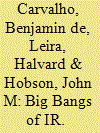

|
|
|
|
|
| Publication |
2011.
|
| Summary/Abstract |
International relations as we know them emerged through the peace of Westphalia, and the discipline of International Relations emerged in 1919 and developed through a First Great Debate between idealists and realists. These are the established myths of 1648 and 1919. In this article we demonstrate how historical and historiographical scholarship has demolished these myths, but that the myths regardless are pervasive in the current textbooks that are used in teaching future IR scholars. Disciplinary dialogue seems to have failed completely. Based on a detailed reading of the myths and their perpetuation, we discuss the consequences of the discipline's reliance on mythical origins, why there has been so little incorporation of revisionist insight and what possibilities there are for enhancing the dialogue.
|
|
|
|
|
|
|
|
|
|
|
|
|
|
|
|
| 3 |
ID:
153237
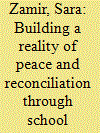

|
|
|
|
|
| Summary/Abstract |
This article shows that effective reconciliation and peace-building require teaching children a constructed narrative based on the opposing stories, especially with regard to an intractable conflict such as the one that characterizes the Israeli–Palestinian case. Textbooks play an important role in any country when it comes to creating collective memory and political consciousness. They change over time, according to political and social powers within that nation, and can support and inspire processes of war or peace education. In a transition period between war and peace, for example, one can distinguish differential trends of texts that convey acceptance, tolerance, minimization of stereotypes and reduction of war imagery compared to the preceding period – all in the service of building a reality of peace and reconciliation.
|
|
|
|
|
|
|
|
|
|
|
|
|
|
|
|
| 4 |
ID:
190973
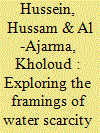

|
|
|
|
|
| Summary/Abstract |
Water scarcity in Palestine is a top national priority issue. Extensive research has analysed the causes of water scarcity in Palestine, focusing on negotiations, the occupation, climate change, environmental conditions, the role of international donors and funders, and mismanagement. Nevertheless, how these representations are reflected in Palestinian textbooks has not been investigated. However, textbooks are key because they reflect the governmental position and dominant discourses and forge future generations’ understandings of water issues. This paper takes textbooks as a case study to analyse the dominant discourses of water scarcity in Palestine.
|
|
|
|
|
|
|
|
|
|
|
|
|
|
|
|
| 5 |
ID:
173689
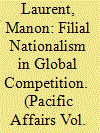

|
|
|
|
|
| Summary/Abstract |
In the early 2000s the Chinese government initiated a profound shift in how it sought to represent China at home and abroad. Whereas many scholars and China watchers argue that a newly assertive China emerged in the wake of the 2008-economic crisis, I argue that this shift took place in the curriculum reforms nearly a decade earlier. An analysis of the evolution of textbooks used for primary Mandarin instruction shows that, starting in 2001, textbooks were developed to inculcate a perennial bond between an increasingly globalized population and its motherland. Specifically, I show how the emergence of “filial nationalism” was crafted in Mandarin-language textbooks, laying the groundwork for a new generation of Chinese youth to simultaneously feel pride for and loyalty to the motherland while preparing them for integration into a globalized world.
|
|
|
|
|
|
|
|
|
|
|
|
|
|
|
|
| 6 |
ID:
185880
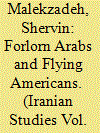

|
|
|
|
|
| Summary/Abstract |
Drawing upon three decades of postrevolutionary textbooks, this article traces the development of the Arab Muslim as a recurring character in the early elementary curriculum of the Islamic Republic, set against the historical context of Iranian modernization and state formation in the twentieth and twenty-first centuries. Sympathy for the Arab by the postrevolutionary state included a rebuke and an affirmation: Look at what has happened to the Arabs who were not able to defend their homes and their homeland, and look at what has not happened to us. Set against the Palestinian Arab figure are the accomplishments of American scientists and inventors who feature prominently in the postrevolutionary curriculum as sources of emulation for young readers. Star turns from Thomas Edison, Alexander Graham Bell, and Orville and Wilbur Wright invite a reconsideration of the role of the foreign Other in the construction of Iranian national identity, notably the expectation that the dispossessed constitute natural allies in Iran's ceaseless struggle against “the West.” Islamization of the primary school curriculum since 1979 has not come at the expense of Iranian national identity but as its expression, elucidating the ways postrevolutionary educational materials can serve as a repository for tracing the continuities and permutations in depicting the Arab or Western Other as well as different civilizational ethos of the Islamic and Persianate world across time.
|
|
|
|
|
|
|
|
|
|
|
|
|
|
|
|
| 7 |
ID:
091091
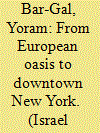

|
|
|
|
|
| Publication |
2009.
|
| Summary/Abstract |
Geography textbooks, like other cultural artifacts, are usually left as unexploited-raw. Ever since its founding, Tel-Aviv has been represented in geography textbooks in a very positive light-the "European oasis in the East". The dominant line in presenting the city remains-a created artifact that testifies to the vitality and power of Zionism, the center of the State of Israel, the very heart of its economy, culture, and society. It is integrated into the processes of globalization, the contemporary symbols of "world cities" apply to it as well.
|
|
|
|
|
|
|
|
|
|
|
|
|
|
|
|
| 8 |
ID:
106042


|
|
|
|
|
| Publication |
2011.
|
| Summary/Abstract |
American history textbooks for the USA's public schools act as quasi-official loci for the renegotiation of national identity and are, as such, subject to much controversy. The choice of heroes and the way in which textbooks depict them display the interplay between competing visions of popular ethno-history and scholarly historiography. This article examines contemporary renegotiation of the national narrative through an analysis of the evolving representation of the USA's two most prominent traditional national heroes - George Washington and Abraham Lincoln - in history textbooks for elementary-school students published from the early 1980s to 2003. This period marks the development of the multiculturalist movement and its subsequent conservative backlash, with debates intensifying in the wake of the events of 11 September 2001.
|
|
|
|
|
|
|
|
|
|
|
|
|
|
|
|
| 9 |
ID:
187412
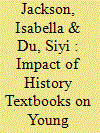

|
|
|
|
|
| Summary/Abstract |
History textbooks are the only history books that the majority of people read in their lives. This article investigates the impact of history textbooks on young Chinese people's understanding of their nation's modern history, as revealed on the popular microblogging site Sina Weibo. We analysed posts related to history textbooks and their representations of three contentious turning points in the communist historical narrative: the May Fourth Movement of 1919, the nationalist assault on the communists in 1927, and the Yan’an Rectification Movement of 1942. Widespread engagement with and recollection of history textbook content indicates a substantial impact of these textbooks on people's understanding of the past and a willingness to relate that past to the present. Responses to textbooks vary widely, from acceptance of the textbook narrative and the expression of strong patriotic and emotional connections to the past as presented in textbooks to open and angry critique.
|
|
|
|
|
|
|
|
|
|
|
|
|
|
|
|
| 10 |
ID:
157048


|
|
|
| 11 |
ID:
120358
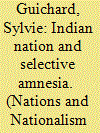

|
|
|
|
|
| Publication |
2013.
|
| Summary/Abstract |
Unity is always obtained by means of brutality' wrote Ernest Renan. Following this idea, this article investigates how social conflicts and violence are included or muted in national history. This is done by comparing the successive series of history textbooks used in India in the postindependence period. The historical narratives contained in the textbooks were influenced by different conceptions of the Indian nation, and these variations allow us to observe and better understand what is remembered or forgotten in the national narrative. We will see that conflicts and violence are referred to when they involve the nation against its 'other' but depictions of conflicts within the nation as it is imagined are avoided. Thus, certain violent episodes of the past find a place in the national historical narrative, yet violence in itself is never described.
|
|
|
|
|
|
|
|
|
|
|
|
|
|
|
|
| 12 |
ID:
161344
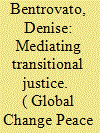

|
|
|
|
|
| Summary/Abstract |
Transitional justice (TJ) and education have recently evolved into key areas of concern in processes of recovery undergone by societies emerging from violent conflict. Referencing the particular case of post-apartheid South Africa, this article investigates the distinct role of school textbooks as mediators of TJ in order to shed light on the under-researched interconnections between these fields. Its analysis of how South Africa’s history textbooks engage with the work of the Truth and Reconciliation Commission explores the discursive and pedagogical strategies they adopt as they deal with this high-profile TJ mechanism. The article’s theorisation will consider textbooks’ possible dual function as both instruments and indicators of broader post-conflict transformation by assessing the possibilities offered by a pedagogical model of TJ education involving history textbooks as ‘heteroglossic spaces’ and as ‘mediators of multivocal discourses’.
|
|
|
|
|
|
|
|
|
|
|
|
|
|
|
|
| 13 |
ID:
168849
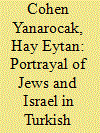

|
|
|
|
|
| Summary/Abstract |
As the autobiographies of nations, the school textbooks’ portrayal of the “Other” is paramount for tackling prejudices and building bridges among nations. Using this idea as a guiding principle when witnessing the rising anti-Semitism and the anti-Israeli trends in Turkish society, this article examines the portrayal of Jews and the State of Israel in the Turkish school curriculum to reveal textbooks’ part in shaping the image of Jews and Israel in Turkey.
|
|
|
|
|
|
|
|
|
|
|
|
|
|
|
|
| 14 |
ID:
190828
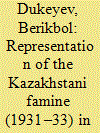

|
|
|
|
|
| Summary/Abstract |
This paper studies the role of textbook authors when portraying the Kazakhstani famine of 1931–33 in textbooks printed between 1992 and 2021 for the secondary school subject ‘The History of Kazakhstan’. Drawing on a multilayered and inter-discursive analysis of seven of these textbooks, and after 10 interviews with curriculum developers and textbook authors, this paper argues that authorship agencies have reflected a level of ambivalence: on the cause(s) of the famine; on their evaluation of it as a tragedy or as a genocide; on the identification of the perpetrators and victims; and the people’s revolt against the collectivization. The textbook authors have echoed the narratives from the cautious approach to the famine’s commemoration portrayed in state-led nation-building, to those in Kazakh nationalist narratives and the academic history. The results of this paper oppose the general assumption that textbook narratives are merely constructed from ‘above’ in a non-democratic state such as Kazakhstan.
|
|
|
|
|
|
|
|
|
|
|
|
|
|
|
|
| 15 |
ID:
143549
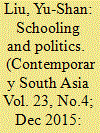

|
|
|
|
|
| Summary/Abstract |
This article presents a study of the textbooks composed and released by the Tibetan Government-in-Exile for the Central School for Tibetans in India. By examining the textbooks on Social Studies and history, it looks at how the Tibetan Government-in-Exile engages with various external and internal ‘others’ in the process of constructing knowledge of the Tibetan nation, and at how it represents Tibetan life to those who were born in exile. It is contended that schooling and power are interrelated, and textbook curricula represent a way in which national power dominates the selection and representation of public knowledge. The article concludes by suggesting that the limits applied by their refugee status to the Tibetans in India has sometimes turned into the energy/force of empowerment, which not only permits flexibility in the shaping of a national identity but creates spaces for negotiating the multiple boundaries.
|
|
|
|
|
|
|
|
|
|
|
|
|
|
|
|
| 16 |
ID:
161345
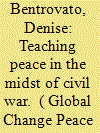

|
|
|
|
|
| Summary/Abstract |
Focusing on Sri Lanka, this article complements existing research on the adoption of global norms and discourses around peace education by illuminating the tensions between global and local demands in a multicultural society torn by conflict. In analysing a series of donor-funded official civics textbooks issued during the civil war, it identifies textbooks as sites of the conflictual ‘hybridisation’ of the liberal peacebuilding paradigm and the challenge to it posed by local interests and sensibilities. The analysis of the discourses around ‘good citizenship’ in Sri Lankan textbooks elucidates a case of the political co-optation of donor-driven agendas, traceable in the uneasy blend of a traditional and a global model of citizenship education simultaneously embracing and undermining liberal ideals of peacebuilding through emphases and silences that may risk compromising national reconciliation. The textbook discourses which enact these processes construct notions of social cohesion around civic virtues, frame rights as privileges earned through compliance and gratitude towards authoritative institutions, promote understandings of peace and conflict which highlight individual responsibility while obscuring systemic violence, and affirm social justice, democracy and human rights while evading the realisation of these ideals in practice.
|
|
|
|
|
|
|
|
|
|
|
|
|
|
|
|
| 17 |
ID:
165959


|
|
|
|
|
| Summary/Abstract |
This article examines how Chinese middle-school history textbooks are written as a means of legitimising the rule of the Chinese Communist Party (CCP), by carefully utilising China's past. The authors identify (or perhaps “construct”) a sinified model of good governance in the textbooks that derives from the teachings of Confucius and Mencius, and the subsequent practises of certain revered Chinese emperors. This model is then applied to CCP leaders in the modern-era textbooks in order to cast them as diligently upholding a time-honoured Chinese tradition of legitimate rule. In a broader context, our analysis fits within the ongoing discussions about the continuing legacy of Confucianism in contemporary China and the CCP's efforts to locate itself within this as a way of fortifying its own legitimacy. We also note how some of the themes of good governance contained in the textbooks are closely linked to contemporary government policies and priorities, such as anti-corruption schemes and constitutionalism. The objective in so doing is to propagate the importance of these themes to a young audience.
|
|
|
|
|
|
|
|
|
|
|
|
|
|
|
|
| 18 |
ID:
126362
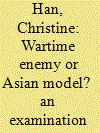

|
|
|
|
|
| Publication |
2013.
|
| Summary/Abstract |
This article compares the history curricula of Hong Kong and Singapore since the 1980s with respect to their treatment of Japan, particularly its involvement in World War II. It examines the role played by Japan as one significant "Other" against which its former victims define themselves. As well as being cast as a wartime aggressor and agent of local "victimhood," Japan has also been hailed as an economic and military model worthy of emulation. By comparing portrayals in school history textbooks and their shifts over time, the author shows how images of Japan have been used by state elites in these two former British colonies to construct significantly divergent official visions of "postcolonial" identity.
|
|
|
|
|
|
|
|
|
|
|
|
|
|
|
|
| 19 |
ID:
138932


|
|
|
|
|
| Summary/Abstract |
In an effort to determine the extent and level of theoretical coverage in introductory International Relations (IR) textbooks, we conduct both latent and manifest analyses of IR theories in 18 undergraduate texts in the discipline. Focusing on realism, liberalism, constructivism, Marxism, and feminism, we find the bulk of theoretical content in chapters that specifically focus on theory. There is much less theoretical discussion in the issue chapters of most introductory texts. While some continue to stress, highlight, and even expand upon the theories in subsequent chapters, just as many focus on the content of the issues and less on providing students with a theoretical assessment of that issue. We discuss the pedagogical ramifications of these findings.
|
|
|
|
|
|
|
|
|
|
|
|
|
|
|
|
|
|
|
|
|